Chess World Cup 2017
From all the chess events around the world, and we’re including the World Championship here, none is as exciting, and as insane, as the WORLD CUP. That’s right: INSANE.
Let’s think about it: the knockout model is already, in itself, synonymous of emotion – it’s the instinct of survival brought to its maximum. In addition, we have the schedule of the tournament: in each phase there are two days of competition (with the exception of the final) of classic chess and then, if there is a tie, another day of tiebreaks (with rapid games, blitz and Armaggedon ). And soon after this tiebreak, more chess …
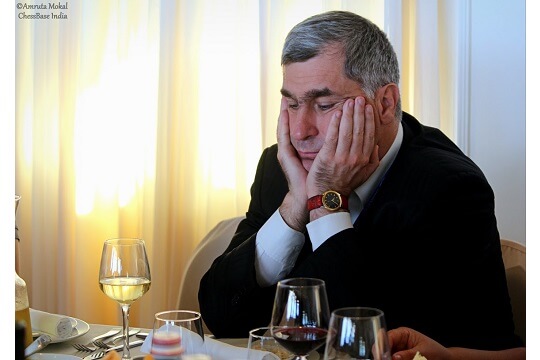
[It’s so much chess that sometimes the player gets confused: “Am I having dinner or am I playing?”]
The are only two rest days: one before the semifinals and one before the great final. And it is logical that those who qualify in the two classical games can rest on the day of the tiebreaks – while several other competitors try desperately to survive. But who guarantees that a heroic victory after an exciting match can’t be more refreshing than a rest day? Regardless of the answer, the point is that we have practically one month of complete chess immersion.
Therefore, to become champion of the World Cup seems to be a feat not only from a chess view, but also from a physical one: it’s a true marathon. And the entire elite of chess is there. Even the current world champion Magnus Carlsen – the first world champion who will have the chance to enter the cycle of the Candidates Tournament of his own reign and, perhaps, to challenge himself. Isn’t this a bit strange?
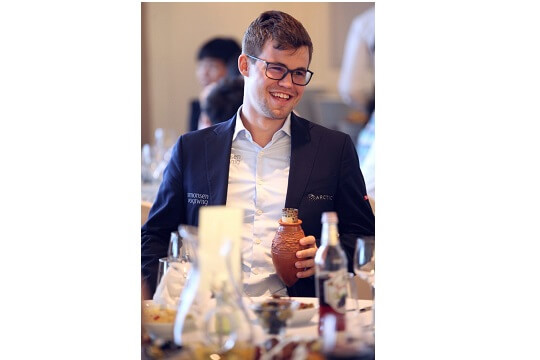
[ “Don’t tell me this … I’m only here for the food!”]
1st Round: Favorites, Latinos & Tiebreaks
The first phase of the World Cup had 64 matches. In fact, 63, since the American Onischuk won by his confrontation against compatriot Zherebukh by forfeit.
Small Reflection On An Unusual Match …
In fact, it’s very strange what happened in this match. Apparently Zerebukh didn’t travel because he could not leave the United States to get his green card. It seems he also didn’t want to lose the $ 6,000 prize. Now he runs the risk (because of this unsportsmanlike conduct, since his spot could have been given to someone who really could have played) of not receiveing a penny and still carry a punishment from FIDE.
Thanks to that, Rafael Leitão is no longer the only player to win a World Cup match by forfeit (in 1999 our young GM against the Iranian Amir Bagheri, who didn’t get a visa for the United States). One detail: at that time prizes doubled after each stage and the championship was played in Las Vegas. Lucky that Leitão, then aged 19, could not legally lose everything in the 3 days that he didn’thave anything to do there …
… Back to Results
Overall the favorites confirmed our expectations – though not all favorites or at least not without some excitement in many of the matchs.
Magnus Carlsen won without great difficulty, as well as: Svidler (runner-up of the last Cup); Grischuk; Nakamura; Caruana; Navara; Aronian; Dreev; Bu; Rapport; Artemiev and the Polish Duda. All of them won their matches by 2 × 0 – Dreev, Bu and Rapport’s victories came with a bit more bitter taste for us, Latin Americans: Dreev defeated Paraguay’s Axel Bachman; Bu won against Argentinean Diego Flores; and Rapport beat the Peruvian Emilio Cordova.
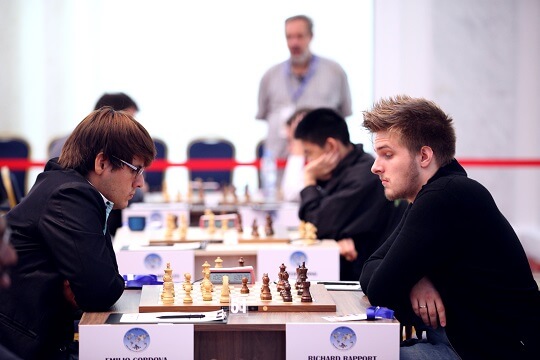
[Córdoba x Rapport. A creative duel. Even in hairstyles]
And other Latin Americans, unfortunately, are already out of this World Cup:
Young Joshua Ruiz Castillo of Colombia, who had the difficult task of facing Wesley So (but Joshua managed to steal half a point from the smiling So);
The Argentinean Sandro Mareco – who was eventually overtaken by the young German Matthias Bluebaum;
The Cuban Yusnel Bacallao, after winning the first game against Russian Vladimir Fedoseev, lost the second. In the tiebreak the Russian played very strongly.
The Argentinean Leandro Krysa, also one of the new Latin talents, like Ruiz, did not resist the Chinese Li Chao;
And the Cuban-Paraguayan Neuris Delgado was unable to overcome the rising Indian Santosh Gujrathi Vidit.
But it was not all bad for the Latin Americans: Peruvian Jorge Cori eliminated the current English champion Gawain Jones by 1.5 x 0.5; the Cuban Lázaro Bruzón also continues in the competition after beating the Spanish David Anton.
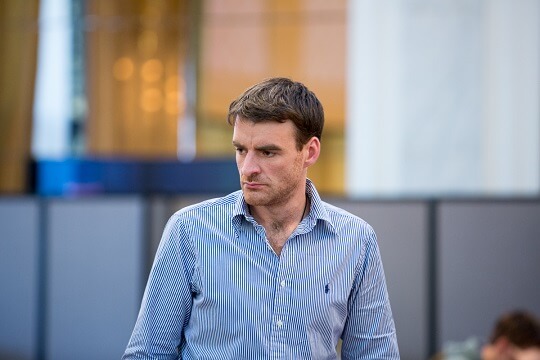
[Gawain Jones: “dislike”]
But some Top GMs had to sweat their shirts a little more. Among them Vachier-Lagrave and Kramnik. Vachier, in the first game, with black, offered a draw after leaving the opening with a clean pawn down against Khusenkhojaev from Tajikistan; Kramnik, against the Chinese Changren Dai, awas also a pawn down, but managed to start a brilliant attack with his bishop’s pair.
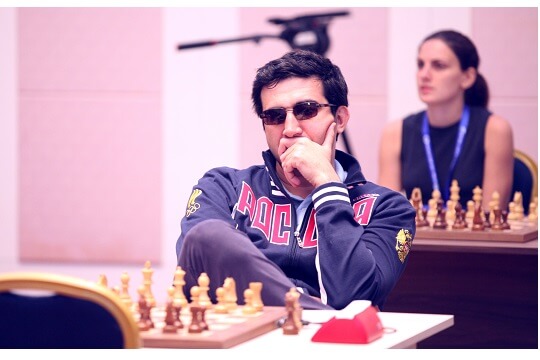
[Even a pawn up would you have the guts to win out against this (mafioso) Russian?]
But Karjakin was the one who suffered more. The Russian could not get more then two draws in the classical games against the youngest chess player in the tournament – the Australian IM Smirnov. But in the tiebreak Karjakin won without great risks.
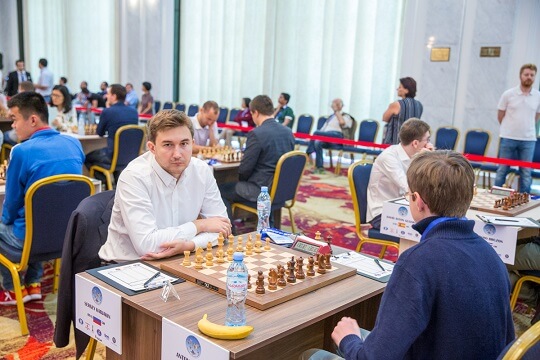
[“Did he really bring a banana? I didn’t like that”]
But the most dramatic match was from Georgian Baadur Jobava against the Spaniard Ivan Salgado Lopez. The decision occurred only in the sixth game. No surprise: home teams always have to win with emotion!
Surprises
But we would not be talking about the World Cup if we did not have some surprises already in the initial stage. And the first big surprise was the elimination of the Ukrainian Pavel Eljanov, who had arrived in the semifinal of the last World Cup, by Alex Lenderman, from the United States.
And the elimination was very cruel: in the first game Eljanov, playing white, with a two pawn advantage, miscalculated and lost a piece. In the second game, needing a win but clearly shaken, he didn’t get much in the opening and trying to keep any chance of victory in a position already slightly inferior ended up losing one more. 2-0 to Lenderman.
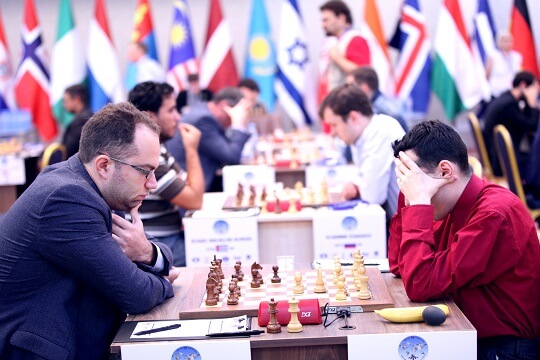
Another small surprise, but this one in the tiebreak, was the victory of the young Tari over David Howell. It’s also worth mentioning the victory of the Indian Sethuraman against the experienced and former World Cup champion Ruslan Ponomariov.
The Brazilians
By now we all know it was not this time. Our boys fought bravely but could not advance.
El Debs had the difficult task of facing the Polish super-theorist Radoslaw Wojaszek – current number 24 in the world. In the first game the Pole took the initiative with the white pieces to score the point. In the second he showed why he is considered a “super-theorist”: he quickly managed to eliminate any attempt Felipe had to play for a win.
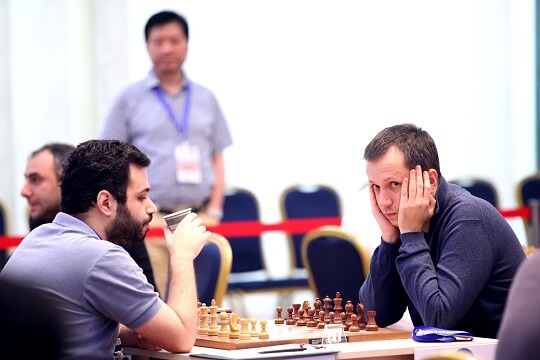
[El Debs task was a very difficult one]
The most Georgian of all Brazilians, Alexandr Fier, looked like he was going to overcome the Frenchman Etienne Bacrot. Fier was completely winning in the first classical game and also had good chances in the first rapid one. But in the end Bacrot advanced by winning the tiebreak by 1,5 – 0,5.
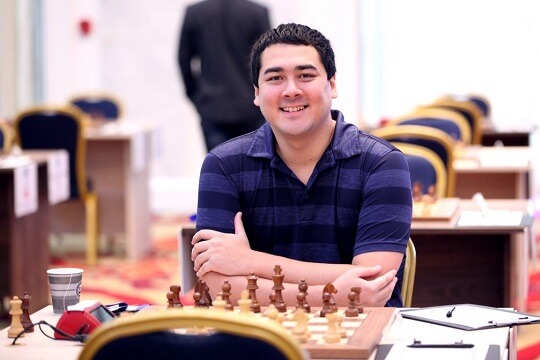
[Thanks!]
SOURCES
Written by Rafael Leitão Chess Academy on 06/09/2017
Do you like this aticle? Share it on the Social Networks!




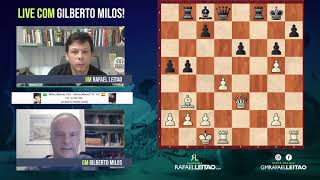
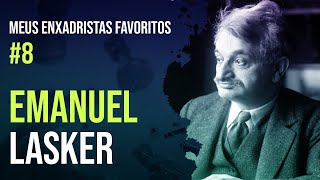
No comments